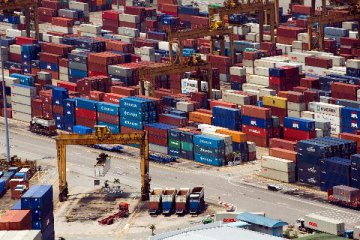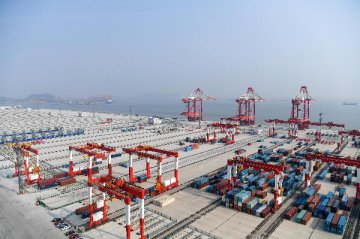
President Donald Trump's continued push to level the global playing field when it comes to trade has done little to disturb the relentless bull market in stocks.
But nothing lasts forever, and at some points investors will have to react if the tensions continue to escalate. By all indications, an acid test could come as early as week, with the administration poised to impose a range of new tariffs on $200 billion worth of Chinese goods.
Running a series of different scenarios in the U.S.-China conflict, experts at FactSet have come up with a worst-case trade war scenario, one in which most major economies would take a hit and the U.S., along with a few others, would see a bear market emerge.
"In the case of the escalating trade tensions between the U.S. and China, while financial markets still appear to be discounting the global impact of a trade war, our analysis shows that if/when the market does react, the effects will be widespread," Ian Hissey, vice president in FactSet's portfolio analytics group, said in a report last week.
Hissey modeled three scenarios: a base case where the dispute continues along its current path and tensions and tariffs gradually escalate; an optimistic result where the U.S. and China reach broad agreements on the future but the newly imposed tariffs remain, and a "conservative" case that involves "rapidly deteriorating" relations and a more profound impact.
In determining impact, Hissey used the market's Brexit reaction, following the 2016 vote that allowed the UK to leave the European Union, as a template.
He came up with results that showed stocks globally dropping between 8 percent and 17 percent, with markets in the U.S., Canada and Israel faring worst and Japan being the only overall winner. Hissey did not provide a time frame for how long the market move would take.
Trade war stress test for stocks
Source: FactSet
In the event of the trade war continuing, investors fleeing from stocks would be looking for safe havens like bonds.
That also results in disparate returns, according to the analysis, with Japan again being the big winner but other countries emerging seeing impacts both positive and negative. The results in the bond market are considerably better than in stocks.
Trade war stress test for bonds
Source: FactSet
Broadly speaking, winners and losers are based on how closely they are tied with the U.S. on exchange rates. Those with a close relationship tend to lose, while those not tethered to the dollar are generally winners.
"The economic intuition seems simple," Hissey wrote. "Tariffs hurt the economies of both trading parties by creating inefficiencies and lowering future economic growth. This would have a negative impact on equity market valuations. In turn, sudden dramatic falls in equity valuations likely create a flight to quality assets."
The latest round in the tariffs is expected to take place soon, with the U.S. enacting new duties, and possible retaliation from Beijing. The U.S. trade deficit with China expanded by $36.8 billion in July and is now at $222.6 billion year to date, according to the Census Bureau.




















Latest comments